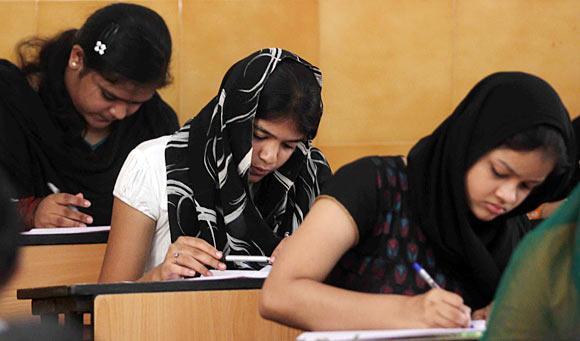 | « Back to article | Print this article |
JEE 2013 Analysis: Math tough, physics easier
Vivek Khanna, an IIT alumnus and education consultant shares his insights on the IIT-Joint Entrance Exam held this year.
About 1,50,000 students from across the country appeared for the IIT-Joint Entrance Examination Advanced on Sunday, June 2.
Performance in the JEE Advanced will help these students seek admission into the prestigious Indian Institutes of Technology.
Here, Vivek Khanna, an IIT alumnus and education consultant offers a comparative analysis of Sunday’s paper and tells us what has changed from last year.
Paper-1
This time around both the multiple choice questions and Integer type questions had negative marking. Last year this was not the case.
This year, single choice questions had no negative marking. Last year there was negative marking for single option correct type questions.
Also the marks for Single Option Correct type of questions has been reduced from three to two per question.

Please click NEXT to continue reading...
JEE 2013 Analysis: Math tough, physics easier
Meanwhile in Paper 2, there were no Single Option Correct type questions.
One of the major changes in the JEE this year was that both in Paper 1 and 2 the Multiple Correct Option type questions followed a negative marking scheme. This was not the case last year.
Also, the marks for Single Option Correct type questions has been reduced from 3 to 2 per question.
Although Matrix Match type of questions did not feature in last year’s paper, this year, they were asked in Single Option Correct form.

Overall, physics paper was comparatively easier than last year.
No challenging questions were asked. So far, no ambiguity in answer has been reported.
Questions were relatively direct as compared to last year. Barring three or four, questions in physics were moderate in difficulty level.
In fact, many students found the Physics paper to be of the AIEEE and board level.
On the toughness meter, mathematics emerged as the most difficult, followed by physics and chemistry.
Given the quality of questions and the new format, one can expect lower cut offs this year around.
While the cut offs hovered around 41 and 42 per cent last year, this year it could be down to 33 per cent.
The results for JEE Advanced are likely to be announced on June 23.

